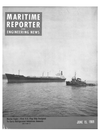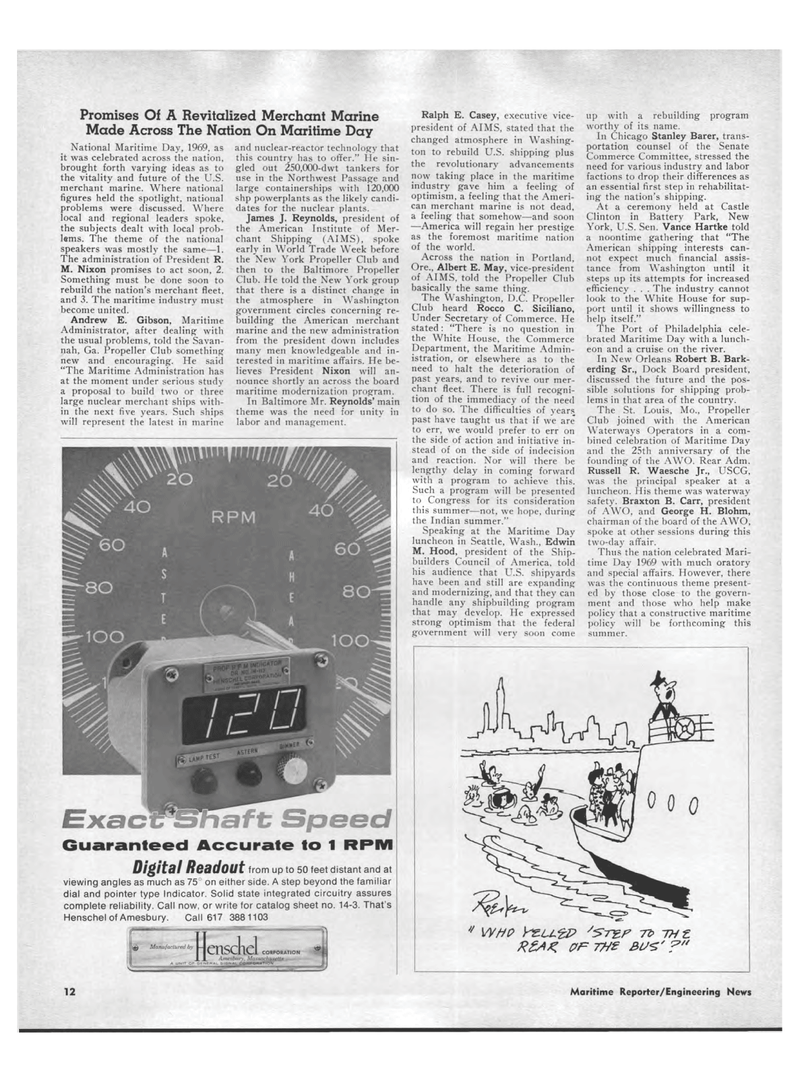
Page 10: of Maritime Reporter Magazine (June 15, 1969)
Read this page in Pdf, Flash or Html5 edition of June 15, 1969 Maritime Reporter Magazine
Promises Of A Revitalized Merchant Marine Made Across The Nation On Maritime Day National Maritime Day, 1969, as it was celebrated across the nation, brought forth varying ideas as to the vitality and future of the U.S. merchant marine. Where national figures held the spotlight, national problems were discussed. Where local and regional leaders spoke, the subjects dealt with local prob-lems. The theme of the national speakers was mostly the same?1. The administration of President R. M. Nixon promises to act soon, 2. Something must be done soon to rebuild the nation's merchant fleet, and 3. The maritime industry must become united. Andrew E. Gibson, Maritime Administrator, after dealing with the usual problems, told the Savan-nah, Ga. Propeller Club something new and encouraging. He said "The Maritime Administration has at the moment under serious study a proposal to build two or three large nuclear merchant ships with-in the next five years. Such ships will represent the latest in marine and nuclear-reactor technology that this country has to offer." He sin-gled out 250,000-dwt tankers for use in the Northwest Passage and large containerships with 120,000 shp powerplants as the likely candi-dates for the nuclear plants. James J. Reynolds, president of the American Institute of Mer-chant Shipping (AIMS), spoke earlj' in World Trade Week before the New York Propeller Club and then to the Baltimore Propeller Club. He told the New York group that there is a distinct change in the atmosphere in Washington government circles concerning re-building the American merchant marine and the new administration from the president down includes many men knowledgeable and in-terested in maritime affairs. He be-lieves President Nixon will an-nounce shortly an across the board maritime modernization program. In Baltimore Mr. Reynolds' main theme was the need for unity in labor and management. Ralph E. Casey, executive vice-president of AIMS, stated that the changed atmosphere in Washing-ton to rebuild U.S. shipping plus the revolutionary advancements now taking place in the maritime industry gave him a feeling of optimism, a feeling that the Ameri-can merchant marine is not dead, a feeling that somehow?and soon ?America will regain her prestige as the foremost maritime nation of the world. Across the nation in Portland, Ore., Albert E. May, vice-president of AIMS, told the Propeller Club basically the same thing. The Washington, D.C. Propeller Club heard Rocco C. Siciliano, Under Secretary of Commerce. He stated: "There is no question in the White House, the Commerce Department, the Maritime Admin-istration, or elsewhere as to the need to halt the deterioration of past years, and to revive our mer-chant fleet. There is full recogni-tion of the immediacy of the need to do so. The difficulties of years past have taught us that if we are to err, we would prefer to err on the side of action and initiative in-stead of on the side of indecision and reaction. Nor will there be lengthy delay in coming forward with a program to achieve this. Such a program will be presented to Congress for its consideration this summer?not, we hope, during the Indian summer." Speaking at the Maritime Day luncheon in Seattle, Wash., Edwin M. Hood, president of the Ship-builders Council of America, told his audience that U.S. shipyards have been and still are expanding and modernizing, and that they can handle any shipbuilding program that may develop. He expressed strong optimism that the federal government will very soon come up with a rebuilding program worthy of its name. In Chicago Stanley Barer, trans-portation counsel of the Senate Commerce Committee, stressed the need for various industry and labor factions to drop their differences as an essential first step in rehabilitat-ing the nation's shipping. At a ceremony held at Castle Clinton in Battery Park, New York, U.S. Sen. Vance Hartke told a noontime gathering that "The American shipping interests can-not expect much financial assis-tance from Washington until it steps up its attempts for increased efficiency . . . The industry cannot look to the White House for sup-port until it shows willingness to help itself." The Port of Philadelphia cele-brated Maritime Day with a lunch-eon and a cruise on the river. In New Orleans Robert B. Bark-erding Sr., Dock Board president, discussed the future and the pos-sible solutions for shipping prob-lems in that area of the country. The St. Louis, Mo., Propeller Club joined with the American Waterways Operators in a com-bined celebration of Maritime Day and the 25th anniversary of the founding of the AWO. Rear Adm. Russell' R. Waesche Jr., USCG, was the principal speaker at a luncheon. His theme was waterway safety. Braxton B. Carr, president of AWO, and George H. Blohm, chairman of the board of the AWO, spoke at other sessions during this two-day affair. Thus the nation celebrated Mari-time Day 1969 with much oratory and special affairs. However, there was the continuous theme present-ed by those close to the govern-ment and those who help make policy that a constructive maritime policy will be forthcoming this summer. Guaranteed RPM Digital Readout from up to 50 feet distant and at viewing angles as much as 75° on either side. A step beyond the familiar dial and pointer type Indicator. Solid state integrated circuitry assures complete reliability. Call now, or write for catalog sheet no. 14-3. That's Henschel of Amesbury. Call 617 3881103 " WHO teLLZP 'S-TZF Tb ~TH £ CfF THf 12 Maritime Reporter/Engineering News

 9
9

 11
11
